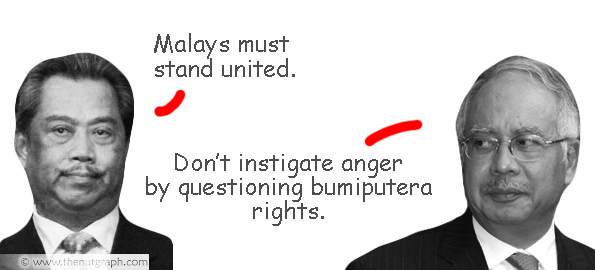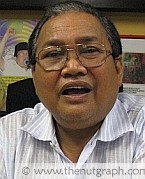
“MALAY unity” and “Malay special rights” are grabbing headlines again. On 5 July 2010, Deputy Prime Minister Tan Sri Muhyiddin Yassin reminded Malay Malaysians that they faced losing political power if they remained divided. On 28 July, Prime Minister Datuk Seri Najib Razakwarned the DAP not to highlight the issue of bumiputera and Malay Malaysian “special rights”. He said such discussions could instigate anger and dissatisfaction.
Such rhetoric has become commonplace in Malaysia. This week, The Nut Graph asks political scientist Wong Chin Huat to comment on what Umno leaders actually mean when they call for “Malay unity”, and what it would take for them to change their tune.
TNG: Do Malay Malaysians have to be “united” to “maintain political control”? Is “Malay unity” even possible? What exactly do Umno politicians mean when they say the Malays must be united?
Wong Chin Huat: “Unity” in Malaysian politics is actually a code word for “elimination of competition” and “one-party politics”. When politicians sing the tune of “Malay unity”, they are basically talking about building political monopoly to control the Malay Malaysian electorate.
Such a monopoly disadvantages both voters and politicians. Voters cannot play politicians off one another for a better deal if politicians were all united. Barring those already in dominant positions, politicians themselves would be denied the chance to compete and progress within their own party based on their strengths. Additionally, when you have no enemy out there, you fight among yourself. Competition is what politics is about, and how human societies operate.
Wanting to eliminate competition is naïve, or sinister, or both. Do we ever lament that hypermarket giants Tesco, Carrefour, Giant and Mydin are divided and engaging in competition, instead of cooperating to give consumers a better deal?
Ultimately, though, politicians’ need to compete will eventually terminate any unity arrangement. That’s why the Umno-PAS alliance in the Barisan Nasional (BN) from 1974 to1978 eventually broke down.
Is it true that non-Malay Malaysians are more united, as some politicians claim?
Would you say the non-Malay Malaysians are united when they have representations in [the different political parties of] the DAP, PKR, PAS, PSM, MCA, MIC, Gerakan, SUPP, SAPP, PRS, SDP, Upko, PBRS and LDP?

(Pic by Luc Viatour | Wiki commons)
If non-Malay Malaysians appear more united rallying behind the Pakatan Rakyat (PR), it is simply because of the threat of Umno. Non-Malay unity will [really] materialise if Umno and PAS work together for “Malay unity”. That’s what happened in the aftermath of 13 Maywhen the calls for both “Malay unity” and “Chinese unity” were popular.
Tony Pua‘s call for selective scrapping of bumiputera discounts for luxury houses led to a warning by Umno information chief Datuk Ahmad Maslan not to “play with fire”. How much longer do you think Umno can assert the “don’t mess with the Malays” rhetoric and survive in Malaysian politics?
The “don’t mess with the Malays” rhetoric survives on two premises. One, the myth that all Malay Malaysians, whether billionaires, labourers, farmers or the homeless, share the same interests and would act in concert. Two, the presumption that people can run amok and act violently and not be penalised because they were somehow instigated.
The first premise is collapsing as it cannot withstand the examination of common sense. What do poor bumiputera have to gain by defending the right of rich bumiputera to buy luxury houses? Will bumiputera billionaires [share their discounted bungalows with bumiputera labourers] for even a day?
The only “rationale” is that the poor bumiputera may hope to rise and somehow become rich, for example, by winning the lottery one day. The discourse of ethnic solidarity is very much one of gambling and get-rich-quick schemes. The premise seems to be this: If someone of the same skin colour or faith can enjoy the privilege of being rich, you can too one day. So, you must defend that probability with your life even if it is just a one-in-a-million chance.
The second premise is more dangerous. If there is impunity for violence, and one can threatenviolence and not get punished, then unless final victory is assured and you are prepared for the sacrifice, it is more rational to back down. What this means is that even if the majority of people are rational, society can be held ransom by a militant minority that enjoys impunity for violence.
Ahmad Maslan must clarify what he meant by “play with fire”. He can easily rebut Pua’s suggestion with reason without the metaphor of fire. Does he imply riots and looting? If so, then Najib should sack him and police must investigate him for criminal intimidation. What reform is the prime minister talking about if a deputy minister thinks and speaks in this manner? Who will invest in a country ruled by the logic of violence?
Do the realities of grassroots sentiments push Umno to take the “ketuanan Melayu” stand to ensure voter support, or is it a miscalculation on their part about what the electorate wants?
No one miscalculates. It’s conflict of interest on different levels. Umno party members and the Malaysian citizenry at large are two different populations. Anyone in Najib’s position will realise the general mood of the nation is to move forward and away from ethno-religious politics. That’s the lesson PAS learned in the 2004 elections.

Ibrahim Ali
But Malay Malaysian politicians not in Najib’s position, from Muhyiddin to Datuk Ibrahim Ali, [have the incentive] to play to the gallery of Malay Malaysians who feel insecure about reforms. Or to those who dream of winning the lottery to become the next bumiputera billionaire. There is a natural constituency waiting for this kind of leadership.
Najib is strategically caught between two goals: on the one hand, fanning dissatisfaction among Malay nationalists against the PR; on the other, wooing the non-Malay Malaysian constituency with his 1Malaysia propaganda. It’s a challenging balancing act, but not mission impossible. All you need are collaborators in the traditional media and an unthinking public that only complains about politicking and refuses to analyse why.
What do you think it would take for Umno to try a different approach than their current “ketuanan Melayu” rhetoric?
Defeat or clear signs of defeat. If the 1Malaysia-Perkasa double-speak depletes non-Malay Malaysian support to a record low of 10%, while PR’s Malay Malaysian support remains at about 40% minimum, then Umno may become the opposition by the next elections. Umno will then realise Malaysians are too smart for their tricks. To avoid this Waterloo, they will have to drop the Perkasa approach and practise what they preach in 1Malaysia.
But there is a danger here. Like any other one-party regime, some in Umno will not bow out in any situation. If they lose the elections, they may resort to palace or military coups to stay in power or to force a coalition government.
Ultimately, Umno needs to transform itself into a democratic party – a party that unconditionally accepts multi-party democracy – before it will give up “ketuanan Melayu”. So, the key to evaluate Najib’s or Umno Youth chief Khairy Jamaluddin‘s credentials as “reformists” is not in their commitment to the New Economic Model, but in their willingness to bow out graciously should Umno lose the next poll.
Wong Chin Huat is a political scientist by training and a journalism lecturer by trade. If readers have questions and issues they would like Wong to respond to, they are welcome to e-mail editor@thenutgraph.com for our consideration. Courtesy of Nut Graph


No comments:
Post a Comment
Note: Only a member of this blog may post a comment.